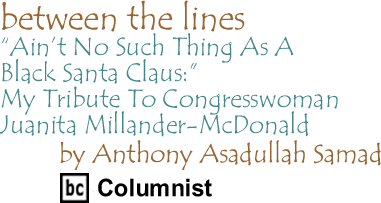
|
|||||||||||||||||||||
|
The current issue is always free to all readers If
you need the access available to a |
|
 |
|
|
A great woman passed away this week. Congresswoman Juanita Millander-McDonald. She was a living example that if you stand for right and walk in faith, God will elevate you to places beyond your expectations. This woman was an advocate for the oppressed and underserved in the truest sense of the word. I’m not talking about what I’ve heard. I’m talking about what I know. I don’t have a lot of respect for politicians. Most of them think you serve them, when they are supposed to be serving you. Juanita Millander-McDonald served her constituency every day she was in public office. She came out of the advocacy tradition and a sincere desire to uplift the downtrodden. She also worked to correct past wrongs in our nation brought by slavery and segregation. This is a woman that I saw grow from a neighborhood leader to a committee chair in Congress. But my greatest memory of Congresswoman Millander-McDonald was twenty years, before she even thought of running for public office. As a young NAACP branch president, my first national media issue involved a little L.A. suburb looking to maintain their dignity against a myth. The industrial city of Carson, which was a black city in the 1980s, was incorporated by many residents and looking to bring retail into the area. Its first shopping mall became the center of a national controversy when, at the height of its holiday shopping season in 1988, its mall manager refused to employ a black man as Santa Claus. Employed by an outside contractor, the man, who was an unemployed construction worker showed up for work—ready to be the mall’s Santa Claus (and his wife, Santa’s elf) in order to make some extra money for Christmas. He was told that he couldn’t possibly be the Santa Claus, because “ain’t no such thing as a black Santa Claus.” It showed to what extent white people were prepared to exclude black people, not only from their reality, but also from their fiction. Racial insanity had now transcended the nation’s biggest myth.
What happened then, I haven’t seen in Southern California before or since. The local NAACP branch in Carson, knowing this issue was too big to handle—called in their “big brother” the 8,000 member Los Angeles Branch to mediate the situation. Then, without permission of the National Office of NAACP (who was butt-scratching on the issue for a whole week), the black residents of Carson called a boycott of the mall on Thanksgiving weekend—the busiest shopping day of the year—to send a signal to the mall owner that they were prepared not to shop there throughout the Christmas season (when retail merchants make 40% of their annual revenues). We counted fifteen (15) people in the mall the Friday after Thanksgiving. We, the NAACP and a group of Carson residents (of which Juanita was one of them), had a meeting with Mall ownership the following Tuesday. The owner made three offers to settle the issue. We rejected three offers. By the third offer, only Juanita and myself thought the offer was insufficient. Everybody else had caved and thought we were being unreasonable. Juanita spoke for the residents and I spoke for the NAACP. We met until 2 a.m. in the morning. And our terms were met. The residents got an advisory council that contributed to community programs. The black Santa Claus victim got a huge settlement. And that mall has had a black Santa Claus every year for the past 20 years. Juanita Millander-McDonald became a local hero, ran for city council, then state assembly and subsequently U.S. Congress. She never departed from her quest for justice and equality. Five years ago, Congresswoman Millander-McDonald went in search of the biggest crime never reported, the bankrupting of the Freedman’s Bank in 1874. Set up to help freed enslaved African Americans to buy homes and farms, 72,000 depositors lost over $3 million dollars ($300 million 2007 dollars) with no justification as to where the money went. While all of the depositors were Black, most of the directors were White. The federal government never assumed responsibility for the loss, nor for the reimbursements that never occurred, until Congresswoman Millander-McDonald raised a federal inquiry, 130 years later. We still don’t know where the money went but we know at least one Congressperson over a hundred years ago tried to find it. Congresswoman Millander-McDonald was one of the first members of Congress to call out America’s failure to address starvation and genocide in Darfur, and in the last few years her biggest fight was trying to fix America biggest travesty, the failure of the public school system.
On the fiftieth anniversary of Brown vs. The Board of Education, Congresswoman Millander-McDonald held a panel discussion at the Congressional Legislative Black Caucus Weekend (of which I was part), set up a national commission (of which I am a part) to return to the premise of Brown and bring equal education to every child in America. As a schoolteacher from her heart, this was her passion and the kind of initiative that showed she never forgot the little people. She did so many other things, but these are the things I remember about a very special woman who gave everything she had to give to her people, her community and her nation. Now every time I see a black Santa Claus at Christmas time, I’ll say to myself, “Ain’t no such thing as a black Santa Claus, right Congresswoman?” May Juanita Millander-McDonald rest in peace throughout all eternity. BC Columnist Dr. Anthony Asadullah Samad is a national columnist, managing director of the Urban Issues Forum and author of the upcoming book, Saving The Race: Empowerment Through Wisdom. His Website is AnthonySamad.com. Click here to contact Dr. Samad. |
|
| Home | |
| April
26, 2007 Issue 227 |
||||||||||||||
|
||||||||||||||
| Printer Friendly Version in resizeable plain text format | ||||||||||||||
 |
||||||||||||||
|
||||||||||||||
 |
||||||||||||||
 |
||||||||||||||
 |
||||||||||||||
| |
||||||||||||||
| |
||||||||||||||































